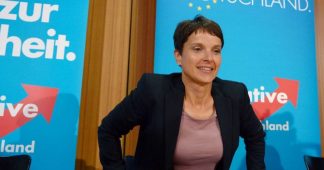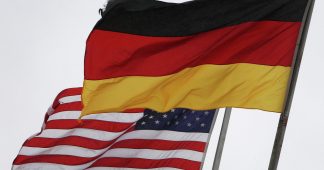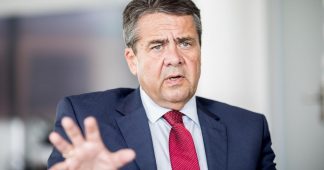Die Linke MEP Fabio DeMasi on why Germany’s fragmented electorate will return Angela Merkel to office this Sunday.
Germany heads to the polls this Sunday in an election which seems likely to return Angela Merkel to the Chancellery.
Shortly after his election as leader of the Social Democratic Party (SPD), Martin Schulz looked like a serious challenger to Europe’s most powerful political leader, even leapfrogging her Christian Democratic Union (CDU) in a number of polls.
But as the election wore on, his centrist politics and conservative approach saw the SPD fail to inspire, and Merkel’s coalition partners now trail her by fifteen points or more in the final week.
Adding to the difficulties for the Left, the populist-right Alternative für Deutschland (AfD) has seen a recovery in recent weeks and is now likely to finish third in the election, a position previously held by Die Linke (The Left).
Jacobin‘s Europe editor Ronan Burtenshaw speaks to Die Linke Member of the European Parliament, and candidate for the Hamburg constituency, Fabio De Masi, about the election’s dynamics, the difficulties faced by both the SPD and Die Linke, and the future of the fight against Merkel.
The English-language press has devoted little coverage to the German elections. So, to start, what issues have dominated the campaign?
The issue of the working poor, as well as the destruction of pensions and health care, are major topics.
Martin Schulz, the candidate put forward by the SPD, rhetorically attacked Ms. Merkel on social issues. But his party, which is in government, is responsible for the biggest postwar attacks on labor. He found it difficult to gain traction as the SPD continued its cooperation with the Conservatives in government. Topics such as terrorism and migration that benefit the AfD are still present in the election.
Additionally, there were cover-ups and scandals in Germany’s auto industry — allegations that it has been able to circumvent environmental laws and hamper innovation in cleaner fuel — and there is a lot of public discontent over the privatization of motorways. It is difficult to find any laws in Germany that go against the auto industry, from speed limits to anything else. You can argue that the country’s economic model relies on it — the industry commands a big chunk of GDP — so it has an impact far beyond these scandals.
As for the election itself, there is not much excitement, simply because Angela Merkel is so far ahead in the polls.
How do you explain Schulz’s disastrous campaign as SPD leader? When he first won leadership, he rose above Merkel in the polls and was touted around Europe as a center-left alternative to Corbyn and Sanders. Now, polls have him behind Merkel by fifteen points or more.
There was a so-called “Schulz effect” for a short time. At first, few people knew who he was in Germany, as he was a face from the European parliament. This meant that he was the best candidate the SPD could choose, because he wasn’t stained by their record of propping up the government.
But that didn’t last long. Schulz avoided outlining a clear program; he was evasive and triangulating. He didn’t define himself on any key issue. And even when he seemed to make moves to distinguish himself, they backfired. He wanted to be seen as an outsider and to be able to attack the government, so he didn’t join it. But this ended up being a strategic mistake because the SPD Foreign Minister has gotten more attention at key moments than him.
The Schulz effect seems to have been driven by people who were disillusioned in politics and were no longer committed to any of the parties. The shift of voters from CDU to SPD was relatively small. It revealed the existence of an untapped reserve army of voters who would be willing to forgive the SPD because their material needs are great. But unfortunately, the SPD’s campaign has failed to appeal to them.
We had a Red-Red-Green (SPD-Die Linke-Greens) majority for the past four years in parliament. Schulz could have used this to try to correct some of the social inequities, even prior to the election. He instead argued “We cannot do this because we are in a coalition” with Merkel. But, when it came to equal marriage, Merkel opened up the decision to the parliament. We passed that with a Red-Red-Green majority. So we said to Schulz, even Merkel has shown that it is possible, why can’t you do it? It could even have been something small, such as equal pay for temporary employment. It could have shifted the election conversation, but the SPD did not want to do anything risky or left-wing.
This undermined their credibility. It is totally unserious to say you will form an alternative, progressive government if you have not even collaborated with the Left in parliament over the past four years. And that conservatism has ultimately led to a large defeat. To win this election, the SPD would have had to break with the recent past and possibly with the government, banking on snap elections when Schulz was still popular.
In the UK, members of the Labour Party brought someone to the forefront who was in opposition to New Labour policies. In Germany, Schulz was selected by SPD bureaucrats. They chose him because the old leadership wasn’t marketable anymore. But he was no rebel and people are not stupid. We knew that he was an establishment figure who supported anti-social policies — and, in time, the public saw this too.
In order to have a renaissance of the SPD, you would need somebody who says “we’ve made political mistakes in recent years, and we are determined to correct them.” But to do that you have to accuse the old leadership and current government of failure. The SPD is part of the government, and at the same time is trying to run an oppositional electoral campaign. It has not worked.
Why hasn’t Die Linke been able to win over these disillusioned voters? Your support is hovering around 9 or 10 percent, only slightly above what you achieved four years ago.
These are longstanding problems for Die Linke. When we were founded a decade ago, merging a left split from the SPD with the old Party for Democratic Socialism (PDS), we mobilized this potential very well. There was a time when we were at 15 percent in the polls and the SPD was at 20 percent. We believed we might overtake them. But we were a marriage of two parties, which produced infighting — especially as one party was the old party of East Germany, which still had a lot of stigma. We had to deal with this in the western part of Germany, which is much larger in terms of the electorate. But the party hasn’t fully overcome its internal factions. This means it is difficult to build common projects with confidence.
We have had two concepts of a party. One was to build a populist left-wing response, perhaps comparable to what Mélenchon and others tried in France, or what Labour tried in the UK with its recent electoral campaign, but there was no consensus on this. A certain part of our electorate expected more immediate material improvements that we couldn’t deliver. Some within our party were coming from the GDR, had been outlaws in the German political landscape for many years, and were driven by the wish to enter a Red-Red-Green coalition. But their political message often stressed the government itself more than our central projects in government. So the question of what Die Linke is for has not been answered.
What is Die Linke’s program for this election? Are there problems here that have contributed to your inability to win over more disillusioned voters?
The demands that Die Linke has on pensions, on bringing German soldiers back home, and on restoring labor rights are supported by broad majorities of the German electorate, even the CDU electorate. So, our problem isn’t the electoral program. The policies we’re proposing are closer to the majority view of the German electorate than the mainstream parties.
But we have a credibility issue. The party has numerous disagreements which not only present a far-from-united face, but also fracture our electorate. Those who are distrustful of the old PDS are reminded of that, while those who are suspicious of younger, urban cosmopolitan voters can come to believe this is our only base. In the end, individual politicians who can put across compelling political arguments are more popular than the party, which can’t.
We see this with [MP] Sahra Wagenknecht, who is among the most popular politicians in the country. I have conversations with people on the street who say “I like Sahra Wagenknecht but I don’t like your party.” But inside the party, Wagenknecht is controversial and regularly criticized. There is a gap between the constituency of voters we want to attract and the party. We have also failed to convince people that we are a real alternative, even as the SPD has struggled. If you appear out of reach of power, a lot of people don’t consider you. So, at the same time, we manage to be not anti-establishment enough without being a possible alternative in power either.
Some divisions in the party can be seen in the migration crisis. There is a generational change in Germany, with younger voters leaning toward left positions, which can be seen on this issue. We have attracted younger voters, even some coming from precarious sectors, which is important for our vote. But at the same time the AfD has become stronger among trade union voters. We have lost quite a lot of ground among workers. We are still strong among the unemployed and those who depend on transfers, as we promise higher social spending, but the backbone of any socialist agenda is the working class and we’re simply not gaining enough traction there.
The difficulty is that Merkel was pursuing an open border policy for some time — not because she was particularly concerned with refugees; after all, she closed it soon after, but to save Schengen and tap the labor market for business. This related directly to Germany’s support for the destabilization of the Middle East in the first place, where it was also a “leader.”
Our mistake was that we did not separate ourselves enough from that. Some people in our party have suggested that we are in the same boat as Merkel against the AfD and the populist right. This is not a socialist position. The better path would have been to fend off xenophobic responses by the populist right but also to keep class and imperialism central to the analysis. We needed to say that German elites who contributed to this disaster with their support for war should pay for the immigration crisis, that we needed supports for refugees funded by taxes on the rich and to fundamentally change our attitude to war.
By contrast, Schulz has tried, unconvincingly, to put forward a harder line on refugees without talking about the root causes. The fear of terrorism and reactionary Islamism is real for many people, and we must recognize that. But the starting point is not to scapegoat immigrants — it is to say: Germany must end its cozy relationship with Saudi Arabia, for example. The Left could have been forceful in this debate but it was too timid, so we ended up with the argument playing into the hands of the AfD.
The AFD is a neoliberal party. At its foundation it was in favor of lower pensions and less workers’ rights. But some of the leadership understood that the migration crisis was an opportunity to embrace working-class voters. They didn’t attack the minimum wage anymore and opposed free trade agreements. This is a big danger; if the right-wing in Germany becomes more focused on social policies, then it could seriously threaten Die Linke’s base.
Die Linke must learn from experiences in Britain, France, and the US if it is to reach broad constituencies again. It must pursue more popular approaches to class issues.
The AfD is an interesting case — they are rising in the polls again, and will possibly be the third party, but they are still some way below the 15 percent they were polling at six months ago. How do you think they will do in the election?
They are weaker than they were before because that was when the CDU was in disarray over migration. Merkel’s refugee policy came under intense pressure in her own party. There is still a dire situation, with many dying in the Mediterranean every month, but the issue has faded from the news. That, and Merkel’s turn away from an open border policy, has helped secure peace inside the CDU. That section of CDU voters who were considering defecting to the AfD based on this issue alone seem to have returned home.
The terrorism issue has helped the AfD re-establish itself in the election. At one stage they were in freefall because of internal tensions. There were controversies of the party’s leadership but also differences in terms of strategy between a more bourgeois center-right voter concerned with the EU and the euro, who were neoliberals in favor of cutting pensions and the minimum wage, and those who were more focused on migration, people who favored some social policies. This created a crisis — but they stabilized in response to the terrorist attacks, which have given them a platform.
The real question is not whether the AfD have 10-15 percent, but whether they could be the leading opposition party. At the moment there are four parties — AfD, Die Linke, the liberal FDP, and the Greens—polling between 8 and 10 percent. Some have the Afd slightly higher, but even if they finish in third place their status will depend on the response of the SPD and whether it goes into government or opposition. If the AfD finishes third and there is another grand coalition, they will have the first response to the government in the parliament, which is significant. That could be an important tool in setting the agenda and influencing the political landscape.
If Merkel wins the election as predicted, what would be the most likely government?
There are basically two options. A so-called “Jamaica Coalition,” which is one between the CDU, the FDP, and the Green Party. The Green Party has a much more right-wing leadership now in terms of not only economic and social policies, but also foreign policies. They are very anti-Russian and support interventionist positions internationally. Otherwise, a new grand coalition — with the CDU and SPD — is possible. However, that would be difficult because there is considerable discontent in the SPD. Their members expect a change in their strategy.
There was also discussion of a Red-Red-Green coalition, but I don’t think that is possible now. Die Linke has never rejected it because it would open up the opportunity to correct certain policies immediately. But the SPD never made any serious programmatic offer, so we haven’t been able to do much on that front. And we can’t help the SPD win the election, which would be a prerequisite to a coalition — they have to do that on their own. At the moment, they seem permanently incapable of doing so.
One of Merkel’s big strengths is the divided electorate. There are those that are happy with the status quo and think that Germany mastered the economic crisis. They don’t see any reason to change the government. But there are also many who are alienated. They haven’t felt any traction with the SPD in this campaign. So, some will vote for us, many will be lost to the populist-right AfD, and others will simply not vote.
This election seems likely to be another triumph for Merkel and the CDU — do you see any potential weaknesses in their political machine moving forward?
I don’t want to end on a pessimistic note. Germany doesn’t exist on a different planet from the British, French, Americans, or other places where the establishment is being challenged. Everyone says that the Eurocrisis is coming to an end, but the next crisis has only been postponed. Neither the Eurozone nor the capitalist economy has been repaired in a fundamental way, or could be said to be in a healthy position. There will be further shocks — which will not necessarily benefit the Left, but which can provide opportunities.
It is about people shaping history. If we make the right decisions on the German left and embark on a strategy of challenging the status quo, we too can shake things up. The remarkable support that some of Die Linke’s leading figures enjoy show that there is potential. I won’t tell an international audience to give up on Germany, because we aren’t giving up. But you should not put your hopes in a Red-Red-Green government after this election. Nor would that be a sign that everything will change. If it existed, under Schulz, with our current politics, it would not be an earthquake. You could not compare it to a victory by Corbyn or Sanders or Mélenchon. Hence, the countries of the European south must confront the beast without banking on change in Germany in the near future. This has great implications for example, with respect to the prospects of reforming the euro.
Fundamentally, the problem is not Merkel. The problem is the SPD. Austerity policies have not only destroyed the lives of millions of people, they have also destroyed social democracy. The parties charged with defending the working class have abandoned the task just as it is most desperately needed. As long as the SPD continues along this path, Merkel’s politics will win.











